
Eurosurveillance
Scope & Guideline
Leading the charge in infectious disease knowledge.
Introduction
Aims and Scopes
- Infectious Disease Surveillance:
The journal provides insights into the epidemiology of infectious diseases across Europe, focusing on trends, outbreaks, and emerging pathogens. It emphasizes the importance of surveillance systems in detecting and responding to public health threats. - Vaccine Effectiveness and Immunization Strategies:
Research published in Eurosurveillance often evaluates the effectiveness of vaccines against various infectious diseases, particularly in the context of the COVID-19 pandemic and other vaccine-preventable diseases. It discusses strategies for improving vaccination coverage and addressing vaccine hesitancy. - Public Health Response and Policy Development:
The journal publishes studies on the effectiveness of public health interventions, response strategies to outbreaks, and the impact of health policies on disease control. This includes qualitative research on the implementation of measures during health crises. - Antimicrobial Resistance:
Eurosurveillance addresses the growing concern of antimicrobial resistance through studies that monitor resistance patterns, assess the impact of antimicrobial use, and explore strategies for combating resistant infections. - One Health Approach:
The journal promotes a One Health perspective, highlighting the interconnectedness of human, animal, and environmental health. Research often includes zoonotic diseases and the role of wildlife in disease transmission.
Trending and Emerging
- Emerging Infectious Diseases and Pathogen Surveillance:
Recent publications emphasize the surveillance of emerging infectious diseases, including novel pathogens like mpox (formerly monkeypox) and variants of SARS-CoV-2, reflecting a heightened awareness of global health threats. - Impact of Climate Change on Infectious Disease Patterns:
Research is increasingly exploring the relationship between climate change and the emergence of infectious diseases, such as vector-borne diseases, highlighting the need for adaptive public health strategies. - COVID-19 and Its Aftermath:
The journal continues to focus heavily on COVID-19, including studies on vaccine effectiveness, long COVID, and the consequences of the pandemic on healthcare systems and infectious disease epidemiology. - Digital Health and Technology in Surveillance:
There is a growing interest in the use of digital health tools, including wastewater surveillance and mobile health applications, to enhance disease detection and public health responses. - Mental Health Impacts of Infectious Disease Outbreaks:
Emerging research addresses the psychological and social impacts of infectious diseases, particularly in the context of the COVID-19 pandemic, recognizing the importance of mental health in public health initiatives.
Declining or Waning
- Focus on Historical Infectious Diseases:
There has been a noticeable decline in publications focusing on historical infectious diseases that were once endemic but are now largely controlled in Europe, such as measles and rubella, as public health measures have significantly reduced their incidence. - Non-communicable Disease Surveillance:
The journal's emphasis on non-communicable diseases and their surveillance has decreased, possibly due to a stronger focus on infectious disease threats, particularly in the wake of the COVID-19 pandemic. - Localized Outbreak Studies:
Research related to localized outbreaks of less common infectious diseases appears to be waning, as the journal increasingly prioritizes broader epidemiological trends and multi-country outbreak investigations. - Pediatric Infectious Diseases:
There is a declining trend in the volume of studies specifically addressing pediatric infectious diseases, possibly due to a shift in focus towards adult populations in the context of the COVID-19 pandemic.
Similar Journals

Vaccines
Pioneering insights into vaccines for a safer world.Vaccines, published by MDPI in Switzerland, is a leading open access journal that has been at the forefront of vaccine research since its inception in 2013. With an impressive impact factor and consistently ranked in the Q1 and Q2 quartiles across leading categories such as Drug Discovery, Immunology, Infectious Diseases, and Pharmacology, it provides a vital platform for researchers to share their findings and advance the field. The journal is dedicated to delivering high-quality original research articles, reviews, and case studies that address the challenges and innovations in vaccine development and immunization strategies worldwide. Open access since its launch, Vaccines ensures that cutting-edge research is widely available to the global academic community and public health professionals, thereby fostering collaboration and enhancing knowledge in this critical area of public health.

Journal of Infection and Public Health
Championing Open Access to Groundbreaking Health ResearchJournal of Infection and Public Health is a premier open-access journal published by ELSEVIER SCIENCE LONDON, dedicated to advancing knowledge in the fields of infectious diseases, public health, and environmental health. Since its inception in 2008, this esteemed journal has become a cornerstone of research dissemination, especially after transitioning to an open-access model in 2017, allowing wider accessibility to groundbreaking studies. With an impressive impact factor and ranking in the Q1 category for Infectious Diseases and Public Health as of 2023, the journal stands at the forefront of scientific inquiry, boasting a Scopus rank of #22 out of 665 in Public Health, underscoring its influence and reach in the academic community. Researchers, professionals, and students alike will find the journal's rich repository of peer-reviewed articles invaluable for ongoing education and practice in a rapidly evolving field. For contributing to the global understanding of health dynamics, Journal of Infection and Public Health is a vital resource, inviting scholars to explore, engage, and contribute to the crucial discussions shaping our world.
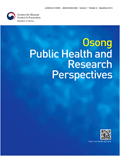
Osong Public Health and Research Perspectives
Empowering global health through open access research.Osong Public Health and Research Perspectives is an esteemed open-access journal dedicated to advancing knowledge in the fields of Public Health and Infectious Diseases. Published by the Korea Disease Control & Prevention Agency, this journal serves as a vital resource for researchers, professionals, and students alike, addressing significant health challenges and disseminating research findings that contribute to public health advancements worldwide. Recognized for its impact, the journal boasts a Q2 ranking in both Infectious Diseases and Public Health, Environmental and Occupational Health categories, as well as a prestigious 94th percentile in Scopus rankings, underscoring its influence and quality. Since its inception in 2010, Osong Public Health and Research Perspectives has provided open access to critical research, ensuring that vital information is readily available to enhance public health initiatives and policy-making. With a commitment to upholding high academic standards, this journal continues to be a cornerstone for collaborative research and discourse within the global health community.

EPIDEMIOLOGY AND INFECTION
Championing Open Access to Transform Health ResearchEPIDEMIOLOGY AND INFECTION is a premier open-access journal published by Cambridge University Press, dedicated to advancing the field of epidemiology and infectious diseases. With an ISSN of 0950-2688 and E-ISSN of 1469-4409, this journal has been at the forefront of disseminating impactful research since its inception in 1970. As of 2023, it holds a prestigious Q2 ranking in both the fields of Epidemiology and Infectious Diseases, reflecting its significant contribution to these critical areas of study, with Scopus rankings placing it at #70 in Epidemiology and #163 in Infectious Diseases. The journal aims to publish high-quality, peer-reviewed studies that contribute to our understanding and management of infectious diseases globally. Operating under an open-access model since 2020, EPIDEMIOLOGY AND INFECTION ensures that research is accessible to a wide audience, fostering collaboration and innovation among researchers, professionals, and students alike. With a commitment to excellence, this journal is an essential resource for those looking to stay abreast of the latest developments in epidemiological research and infectious disease management.

Archives of Clinical Infectious Diseases
Pioneering Research for Public Health ImpactArchives of Clinical Infectious Diseases is a peer-reviewed journal dedicated to advancing knowledge in the field of infectious diseases, published by BRIEFLAND in Iran. With a broad scope, it covers various aspects of cardiology, critical care, immunology, microbiology, public health, and toxicology, affirming its relevance in today's health landscape. Despite the lack of open access options, the journal maintains a strong reputation, reflected in its Q3 ranking in multiple categories within the 2023 category quartiles. The journal aims to provide a platform for researchers and practitioners to disseminate critical findings that can impact clinical practices and public health policies. Its commitment to rigorous peer review ensures that only high-quality research is published, thereby serving as an essential resource for professionals, students, and public health advocates. For those engaged in the ever-evolving world of infectious diseases, Archives of Clinical Infectious Diseases stands as a vital contribution to the medical literature.

Reviews and Research in Medical Microbiology
Pioneering Insights into Pathogens and HealthReviews and Research in Medical Microbiology is a premier academic journal published by LIPPINCOTT WILLIAMS & WILKINS, focusing on groundbreaking research and comprehensive reviews that advance the understanding of medical microbiology. With an ISSN of 2770-3150 and an E-ISSN of 2770-3169, this journal serves as an essential resource for researchers, healthcare professionals, and students dedicated to the study of pathogens, infectious diseases, and microbial mechanisms affecting health. While the journal currently does not offer open access, its rigorous peer-review process ensures that only high-quality, impactful research is disseminated to the scientific community. The journal aims to bridge gaps in knowledge by presenting cutting-edge studies that explore novel therapeutic strategies, diagnostic methods, and the evolving landscape of microbial resistance. Nestled in the heart of Philadelphia, this journal proudly contributes to the advancement of medical microbiology and is an indispensable platform for the publication of critical findings that shape clinical practices and research trajectories in the field.
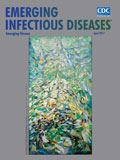
EMERGING INFECTIOUS DISEASES
Leading the Charge Against Global Infectious ChallengesEmerging Infectious Diseases, published by the Centers for Disease Control and Prevention, is a leading open-access journal that has been dedicated to the field of epidemiology, infectious diseases, and medical microbiology since its inception in 1995. With an impressive impact factor placing it in the Q1 quartile rankings for multiple categories including Epidemiology, Infectious Diseases, and Medical Microbiology, this journal serves as a vital resource for researchers, practitioners, and students dedicated to combating the challenges posed by emerging infectious diseases. The journal's distinguished Scopus ranks further highlight its global influence, ranking #10 in Epidemiology, #26 in Infectious Diseases, and #13 in Medical Microbiology, all within the top percentiles. Accessible and targeted, Emerging Infectious Diseases publishes seminal research and reviews that contribute to the understanding and management of infectious diseases, ensuring that critical insights reach a broad audience. The journal encourages contributions that advance the scientific community’s knowledge and responses to public health challenges.
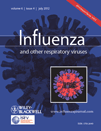
Influenza and Other Respiratory Viruses
Uncovering insights into influenza and beyond.Influenza and Other Respiratory Viruses, published by WILEY, serves as a prominent peer-reviewed platform for the dissemination of research contributing to the understanding and management of respiratory viral infections. With an impressive impact factor and established as an Open Access journal since 2014, it ensures maximum visibility and accessibility of pivotal research findings in the realm of Epidemiology, Infectious Diseases, Public Health, and Pulmonary and Respiratory Medicine. Registered under the ISSN 1750-2640 and E-ISSN 1750-2659, the journal boasts Q1 rankings in four critical categories as of 2023, underscoring its significance within the scientific community. Researchers, professionals, and students can benefit from the convergence of knowledge that this journal facilitates from 2007 to 2024, fostering advancements in understanding viral pathogens and innovative treatment strategies that are increasingly vital to public health efforts globally.
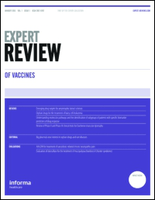
Expert Review of Vaccines
Pioneering Research to Shape the Future of Vaccines.Expert Review of Vaccines, published by Taylor & Francis Ltd, is a pivotal open access journal that has established itself as a leading source of peer-reviewed articles focusing on vaccine research, development, and policy. With an impressive categorization in the top quartile (Q1) across various domains including Drug Discovery, Immunology, Molecular Medicine, and Pharmacology for 2023, this journal plays a crucial role in disseminating high-quality scientific findings that drive advances in the field. Located in the United Kingdom, it serves a global audience of researchers, healthcare professionals, and students seeking to stay abreast of cutting-edge developments in vaccination strategies and technologies. The journal’s Scopus ranks further attest to its excellence, boasting remarkable placements in Pharmacology and Drug Discovery, reflecting its impact and reach. Since transitioning to an open access format in 2023, the journal has enhanced accessibility to vital research, empowering a broader audience to contribute to and engage with the discourse surrounding vaccines. As the field of immunization continues to evolve, Expert Review of Vaccines remains a cornerstone for those committed to advancing knowledge and practice in this essential area of health science.
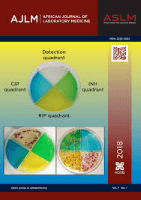
African Journal of Laboratory Medicine
Innovating clinical practices across the continent.The African Journal of Laboratory Medicine, ISSN 2225-2002, e-ISSN 2225-2010, is a premier publication dedicated to advancing the field of laboratory medicine within the African context. Published by AOSIS since 2012, this Open Access journal aims to disseminate influential research findings, clinical studies, and innovative techniques in the realms of Clinical Biochemistry, Medical Laboratory Technology, and Public Health. Based in South Africa, the journal not only serves as a critical platform for sharing knowledge and best practices but also plays a significant role in fostering public health discussions relevant to the continent. Over the years, it has established itself with impactful rankings in various categories, including a Q4 in Clinical Biochemistry and Q3 in both Medical Laboratory Technology and Public Health. As such, it caters to a diverse audience of researchers, professionals, and students eager to stay at the forefront of laboratory medicine research and its applications. The journal’s commitment to quality and accessibility positions it as an essential resource for those looking to make a significant impact in their respective fields.